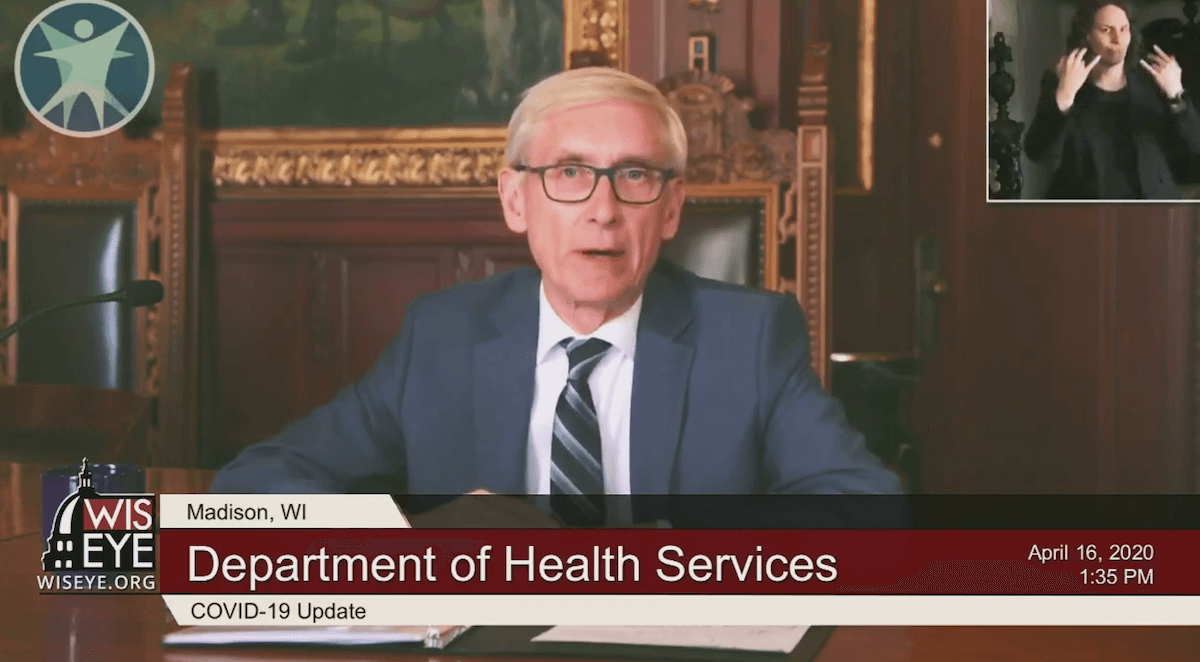
#image_title
Angered Republican lawmakers threaten to fire head of state health agency
Gov. Tony Evers announced Thursday the safer-at-home order has been extended until the day after Memorial Day and public schools will be closed the remainder of the academic year.
The order was set to expire at 8 a.m. Friday, April 24. It will now end the morning of Tuesday, May 26. Evers said the existing order has saved at least 300 lives, according to modeling conducted by state health officials.
“A few weeks ago, we had a pretty grim outlook for what COVID-19 could mean for our state, but because of the efforts of all of you, safer at home is working. That said, we aren’t out of the woods just yet,” said Evers in a statement. “As I’ve said all along, we are going to rely on the science and public health experts to guide us through this challenge. So, as we extend safer at home, I need all of you to continue doing the good work you’ve been doing so we can keep our families, our neighbors, and our communities safe, and get through this storm together.”
Within hours of announcing the extension, several Republican lawmakers began calling for an extraordinary session of the legislature to meet to reject Andrea Palm’s nomination as secretary of the state Department of Health Services. Palm has been serving as the secretary-designee since Evers nominated her over a year ago.
Lawmakers so far calling for her resignation include Sen. Steve Nass, R-Whitewater; Sen. David Craig, R-town of Vernon; and Rep. Duey Stroebel, R-Saukville. The lawmakers claim Palm is acting beyond her authority in extending the stay-at-home order at the request of the governor.
“Now, when the economy is on its knees, rather than seeking ways to re-open the economy with little-to-no risk, Sec.-designee Palm has once again acted far beyond her authority,” said Craig in a statement. “As such, the legislature must act immediately to reject her nomination and remove her from her position.”
As of Thursday, the death toll in Wisconsin due to the virus had risen to 197, reflecting 15 more people who have succumbed to COVID-19. The number of people testing positive for COVID-19 in Wisconsin during the outbreak has risen to 3,875, an additional 154 people from Wednesday. Of those people testing positive, 1,121 have required hospitalization, an increase of 30 since Wednesday.
The extension of the Safer at Home order includes a few changes.
Some changes allow more businesses and activities to open back up, while other changes help make businesses safer for employees and customers.
The changes in this order include: allowing public libraries to provide curbside delivery and allowing golf courses to open with a few restrictions. Clubhouses and pro shops must remain closed and scheduling and paying for tee times must be done online or by phone. Arts and crafts stores also will be allowed to make curbside deliveries for customers to pick-up materials necessary to make face masks.
Companies that perform exterior construction or lawn care work may also get back to work, provided the work is done by one person per job.
These changes will not start until April 24, when the current order expires. To be clear, golf courses will not be allowed to open until April 24.
Evers said Wisconsin has joined Minnesota, Michigan, Illinois, Ohio, Kentucky and Indiana in a multi-state pact that will mutually decide when to reopen their economies.
Before the state can reopen completely, the testing capacity has to increase, the amount of masks, gowns and gloves to keep essential workers protected must increase, contact tracing must increase and the daily analysis of the data must show it is safe to dial back the order, Evers said.
Palm said the state has expanded its testing capacity from 500 to 7,000. She said the state is working to get the message out to doctors and other providers that they can start ordering tests for patients in the clinic setting with mild symptoms.
This is a big shift from the previous practice when the lack of tests and the limited lab capacity only allowed hospitalized patients and those exhibiting severe symptoms to be tested.
“We are no longer living in a world quite so restrictive on who can have a test,” Palm said.
As for increasing the number of contact tracers, or the people who interview those who test positive to obtain where they have been and who they have been in contact with, Palm said roughly 130 people have been transitioned to the role. Another 50 people are in training this week with 75 more trainees behind them.
“These steps will help us reduce the risk of a second wave of the virus,” Palm said. “If we open up too soon, we risk overwhelming our hospitals and requiring more drastic physical distancing measures again.”
Evers responded to questions about mounting pressure from police chiefs in smaller, more rural towns to lift the order by saying the likelihood the virus is in every county in this state is “real strong.”
He said that while rural counties may have the smallest number of cases, they also have the fewest medical resources.
“One spike could close down a small rural hospital in a few days,” Evers said. “This is a statewide, comprehensive approach. We are doing it for them.”
Evers also echoed concerns raised in mid-March by officials in Door, Vilas, Oneida, Ashland, Sawyer and Bayfield counties telling people not to travel to their cottages or second homes as this also would overwhelm their healthcare systems.
Senate Majority Leader Scott Fitgerald, R-Juneau, expressed displeasure at the “one-size-fits-all approach.”
“Rural counties of our state haven’t seen nearly the number of cases that urban and suburban areas have, yet are bearing the full economic impacts of this crisis,” said Fitzgerald. “While we all want to keep people safe, some regions of the state remain less affected by the virus than others – this order doesn’t recognize that.”

This billionaire’s PAC is spreading a big lie about Tammy Baldwin, Medicare, and taxpayer savings
Restoration PAC, funded by Uline’s Richard Uihlein, twists the significance of forcing Big Pharma to negotiate for lower bulk pricing on Medicare...

New Biden rules deliver automatic cash refunds for canceled flights, ban surprise fees
In the aftermath of a canceled or delayed flight, there’s nothing less appealing than spending hours on the phone waiting to speak with an airline...

Opinion: It’s time for Congress to fight for small businesses instead of big corporations
May is National Small Business Month. Our elected leaders need to show leadership all year long. For the past 27 years I’ve been fortunate to pursue...

Biden makes 4 million more workers eligible for overtime pay
The Biden administration announced a new rule Tuesday to expand overtime pay for around 4 million lower-paid salaried employees nationwide. The...




